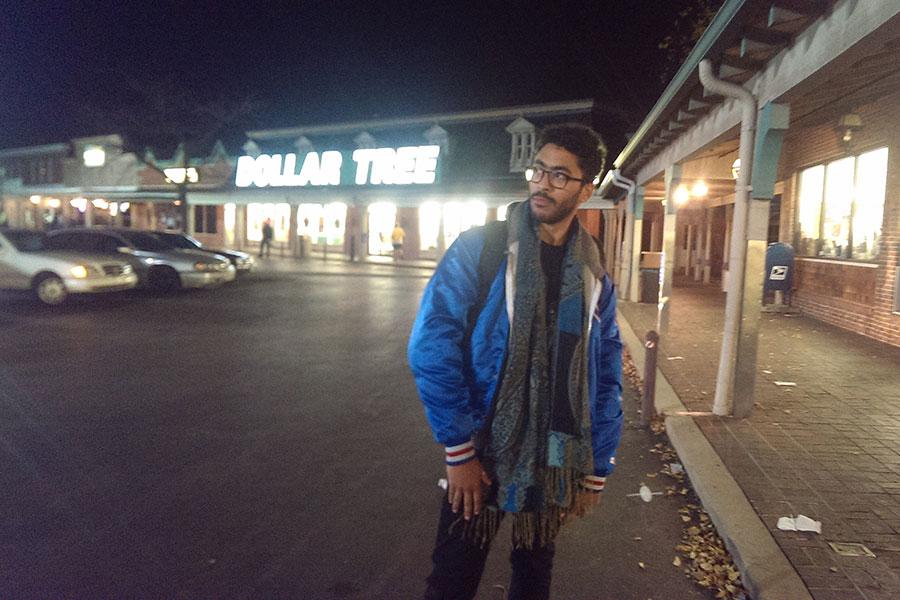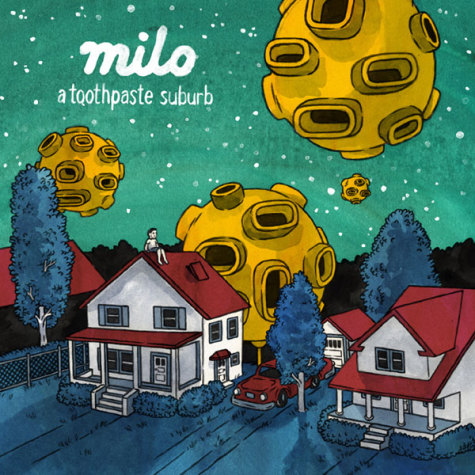Interview with Milo
Staffer Alex Ralston sat down with and interviewed rapper Milo while he was touring through Kansas City
November 14, 2014
Rory Ferreira, aka Milo, is an L.A.-based art rapper that, whether or not the industry is prepared, has been making his way to the forefront of the underground hip-hop scene. Known for his off-kilter flows, witty humor, and highly referential lyrical content, Milo was signed about a year ago to the Hellfyre Club record label; he’s since become of one of their more prominent and popular members. I had the chance to sit down with him for a very lengthy, thoughtful interview. This is the result.
Alex Ralston: Do you think that your dad was a big influence on your decision to make hip-hop?
Milo: Yea, probably. Probably one of the biggest ones, you know?
AR: I’ve been hearing you describe your dad as a wrestlemania fan and rap lover, sort of a macho man–do you feel like you’re any different than him?
M: Yeah, I mean I’m a lot different than my father, but I honor the same idols that he does. Like being tough–that seems important. He’s really about just independence and agency. So if being able to punch a dude through his face helps him do what he wants, he’s interested in how to punch people through their faces.
AR: You’ve told stories about punching a kid when you were little in order to stop him from harassing the neighbors. Do you think your dad was proud of you?
M: I think so, yeah. I don’t know what he would say now, but I think he was proud at the time.
AR: It seems like you stopped using your main producer, Riley Lake, after the mixtape “Cavalcade,” even though he helped mix some of the songs on your most recent album, “A Toothpaste Suburb.” Am I right in saying that?
M: Well, no, he’s not my main producer. I mean, he never was my main producer, that’s the thing. It’s like when you have mixtapes and you make a record with someone, people think that’s your main producer. It’s like, “No, we just made a record.” He’s my boi, he’s my guy, but it’s never going to be he and I until the end.
AR: Could you ever see him coming back and doing a whole other album with you?
M: With him? I don’t know. Right now he’s really obsessed with making these maximalist sounds. His aesthetic has veered from mine, and mine has veered from his as well. Again, he’s still my friend. We just toured through Milwaukee and I slept at his house. He’s still my boi, but he’s just making a different kind of music. He wants to make club music right now–what do they call it? Jersey club, I think?
AR: It seemed to me there was a pretty big shift in your sound from Cavalcade, because it felt like you were dropping the philosophical element from your music.
M: No, I wasn’t dropping the philosophy. It was more just dropping the references. If anything I think “Cavalcade” is one of my most philosophical albums, because it’s actually talking philosophy. It’s not like, “Hey, this is a book I read! Hey, this is a guy I know!” Now it’s just talking philosophy.
AR: And you followed that trend on “A Toothpaste Suburb.”
M: Yeah, I know! And it’s so funny people that people think [I was dropping philosophy] because that element “isn’t as prevalent.” No, it’s more prevalent than it’s ever been!
AR: Just dropping the name-dropping.
M: Right! I don’t know. It’s weird, man people will say, “This dude just name drops and he thinks he knows everything.” So I stopped name dropping. I never had to do that to begin with. And then I just started talking philosophy in brassed terms, and people say, “Man, I don’t know what he’s talking about. Half of this sh*t’s meaningless.” No–philosophy’s just really hard, right? It’s not meaningless at all!
AR: I know a lot of older people think of you in that way, too. You know, “This guy think’s he’s just so smart.”
M: I mean, I agree with them. When I listen to my old sh*t I just hear a kid trying to show off. I think “Toothpaste” is a real album. I think there are real statements made on there. There are times where I was able to not browbeat, but actually make a point. And I’m proud of that.
AR: It felt like every project you’ve released up to this point has had a love song on it. On “Night” you had “Folk Metaphysics, 2nd Ed.” and on “Cavalcade” there was “Besos.” I think you had mentioned that the newest one was “You Are Go(o)d To Me.”
M: Have the [older people] heard that one? I think they’d actually understand it. That’s the most real love song, when you’re past the pretense, when you’re past the “everything is good” kind of stuff. I moved in with my girlfriend in Chicago, we got an apartment together. It’s about all the little stupid things…like being upset at the ones you love because of stupid stuff. “Oh, you didn’t clean the dishes again?!” and “You left me hanging at this place!” All these stupid complaints, all these stupid things that people lie about, all that stuff. That’s what I was trying to do with it, you know? That song is about being in love with someone so much that they’re like God to you, and you’re just at their mercy.
AR: I heard a song you recently put out called “Take Advantage of The Naysayer,” in which you mentioned something about “bald haters.” Is this a response to Anthony Fantano from the Needle Drop (who has usually given your projects good reviews) scoring “Toothpaste” poorly?
M: Absolutely.
AR: Do you have a beef with him or no?
M: I don’t care about him. I just think his review of my record was uninformed and beside the point. And that to me is the essence of a hater–someone who is uninformed and beside the point. I see their commentary and I’m like, “Why are you saying this? What do you bring to the table?” And it’s not just because he gave my album a score of 5/10. Just when I listen to the review, I don’t hear an informed opinion this time around, and I think a lot of the comments on that review show that.
AR: But does that mean then that in order for a review to be informed, it has to agree that the album was good?
M: No, I just don’t hear any… What were the major critiques, again? The first half of [the review] was him putting me in a historical context, I guess. Then the latter half was… what exactly? I don’t mean to discredit him as a critic, but that particular review just seemed uninformed and beside the point. That he did that, it felt like he wanted a response. Everyone in Hellfyre Club felt that way, too. I went to all my elders and asked them and they all said that it seemed like a personal thing, so I responded and I wrote a song. “Take advantage of the naysayer” is one of Schopenhauer’s rhetorical arguments. He has a list of 37 or something like that. So when someone is constantly sh*tting on you, you recontextualize the argument so they have to affirm the negative at some point. So the idea behind “Take Advantage of The Naysayer” was to write a new song that I knew he would like.
AR: Do you think that, during the internet age, artists don’t connect with hometown artists as well as artists on the internet (e.g. Soundcloud, Youtube)? That is, do you think you found more people to connect with in your hometown or on the internet?
M: I definitely found more people on the internet, but I have a really good memory; so I know who all those people are, internet or real life. The people who have influenced me are very important to me, so I try to let them know that and keep them in my life.
AR: You were very close with your childhood friend Rob, who passed away years ago. Is there ever going to be a point where you don’t write songs for him?
M: Probably not.
AR: Are you ever going to quit rap?
M: Yeah. I don’t know, man. I quit rap all the time, but I just return to it. I quit it so much but I just don’t make a big thing out of it. But after this tour is finished, I’ve been really planning on [actually] leaving, like deleting my twitter. I just hate all this sh*t. Not this sh*t (referring to the interview). But I hate that I moved to L.A.; I hate that I’m part of a music scene; I hate that I have to email agents; I hate that I have to worry about what other “bigger” rappers think of me; I hate that I have to think about P.R.; I hate all of it, and I don’t want to do it anymore.
AR: Well, you can obviously move in whatever direction you want, but I think I speak for your fans when I say that I hope you keep rapping and stay in music.
M: I don’t mean to say that I hate you guys, I just mean to say that this, THIS (referring to his earlier statement), is mad stressful.
AR: What do you think of Kansas City so far?
M: I’ve been to Kansas City before actually. I liked more where I played last time, though. I played at the Riot Room last time, and it was fun… smaller, too, which I love. It was also next to a really cool store which gave us a discount on pants. At the time, I only owned one pair of pants, so I was real gassed that they give me a discount on pants just because I was rapping next door. I really loved that place. This place is alright… but Kansas City as a whole seems great.
AR: Is there an afterlife and what’s in it?
M: I don’t know, I couldn’t speak to it. Whenever I think about dying, I just think about Kant. I think about how he puts–and Wittgenstein, too–they put all that stuff in the realm of the mystical. It’s just outside of our capacity to understand, and that’s why you can’t say it does or doesn’t exist. That’s why it’s inspiring, because it’s so ambiguous. I only just realized ambiguity is where the inspiration comes from. If I knew I wouldn’t even want to tell you.
AR: Final question: if you were an animal, what would you be?
M: You know what? More than anything these days, I feel like Rory. I feel like me, but it’s problematic. I feel like when I started rapping, I had no conception of Rory, of me, so it was very handy to rap and accumulate an identity. Nowadays, I feel so much like me, but that’s kind of at odds with this Milo construct; and now I’m existing where the tension is. To answer that question more fancifully, I always feel like a deer. I feel like a slightly regal, but weak animal. Deers look so resplendent, but they’re kind of dumb and easily killed. I think that’s what I am. I give off this air of “oh, he must be special,” but I’m the type of dude to run into a car and die. So yeah, I guess a deer.




